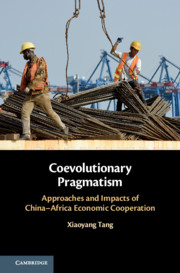Book contents
- Coevolutionary Pragmatism
- Coevolutionary Pragmatism
- Copyright page
- Dedication
- Contents
- Figures
- Tables
- Preface
- Foreword
- Abbreviations
- 1 A “Model” with No Model
- 2 Trade
- 3 Infrastructure
- 4 Agriculture
- 5 Manufacturing
- 6 Special Economic Zones
- 7 Employment and Training
- 8 Social and Environmental Responsibility
- Conclusion
- Index
3 - Infrastructure
Published online by Cambridge University Press: 24 December 2020
- Coevolutionary Pragmatism
- Coevolutionary Pragmatism
- Copyright page
- Dedication
- Contents
- Figures
- Tables
- Preface
- Foreword
- Abbreviations
- 1 A “Model” with No Model
- 2 Trade
- 3 Infrastructure
- 4 Agriculture
- 5 Manufacturing
- 6 Special Economic Zones
- 7 Employment and Training
- 8 Social and Environmental Responsibility
- Conclusion
- Index
Summary
Infrastructure plays a crucial role in a country’s political, economic, and social development, but it is often accompanied by enormous costs and risks. This chapter examines the real impacts and sustainability of China-financed infrastructure in Africa. Learning from the lesson of the Tanzania-Zambia Railway and the experiences at home, China does not depend on either state sponsorship or pure market to carry out infrastructure cooperation. Seeing the interdependence between infrastructure and industries, Chinese mobilize multiple stakeholders and combine various resources to improve commercial feasibility of infrastructure projects in Africa. Meanwhile, diverse manners of coordination are flexibly adopted to address specific challenges in each project and country. Resource-for-infrastructure deals were made possible not only for national reconstruction of oil-rich Angola, but also for industrial empowerment of agrarian Ethiopia. As the volume of infrastructure financing soars, debt stress has also become a concern, especially regarding the monumental railway projects in Ethiopia and Kenya. Correspondingly, lending terms and coordination efforts for these projects are revised. Yet, China’s strategy of raising productivity through infrastructure construction to foster virtuous circle of development in Africa remain unchanged in spite of pragmatic adjustments.
- Type
- Chapter
- Information
- Coevolutionary PragmatismApproaches and Impacts of China-Africa Economic Cooperation, pp. 74 - 101Publisher: Cambridge University PressPrint publication year: 2021



